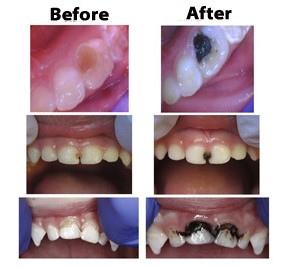Tooth decay and cavities are common dental issues. At Dentistry @ Arnprior, we can help you prevent tooth decay, or restore your tooth to help prevent further decay with Dental Fillings and Sealants.
Modern dentistry has allowed us to combine beauty as well as strength when filling teeth. Restorations are close to their original strength and appearance with composite resins and other modern materials. The patient’s comfort is always the main priority of the dental team, leading to a positive experience.
Fillings (restorations) are used to replace tooth structure that is decayed. Caries can be detected through direct observation or x-rays. Fillings are also used to repair fractured, broken, or severely worn teeth.
The dentist will proceed to cavity preparation, removing any remaining decay and shaping the final cavity. The next step will be the addition of composite-resin filling material, cured (hardened) after with a curing light. The final step will be polishing the filling to adapt it smoothly to the natural shape of the tooth.
Composite fillings are very aesthetic restorations since they are available in natural shades matching tooth color. They are also being tolerated perfectly by all the patients. In some cases cavity preparation could become very large for usual fillings and the dentist will recommend an inlay or an onlay (partial crown), restorations designed to replace more tooth structure. Those restorations are made in a dental laboratory after the dentist has taken you an impression of the preparation. The final placement of inlay or onlay will be made in a second visit at the dental office.
Fillings do not last forever so it is essential that you visit the dentist regularly for further examinations. Fillings can develop cracks or simply wear down due to chewing forces. The dentist monitor the integrity of your fillings during regular exams and will recommend replacing a filling if a problem is detected.
Sealant can work wonders for your smile. Using materials that match the shade, translucency and the texture of your teeth, gaps between teeth can be closed, spots and discolorations can be eliminated, and your self-confidence can be enhanced through the improved appearance of your smile.
The dentist will match the shade of your existing teeth and then tooth-colored composite resin is applied to the tooth much like the filling procedure.
The procedure is sometimes referred to as sealant because an adhesive agent is used to actually bond the resin to the tooth structure.
The resin is hardened (cured) with a curing light and then shaped, contoured, and polished to give a cosmetic and natural appearance. Sealant is the least expensive cosmetic procedure and can be completed during a single dental visit.
Composite sealant is excellent for small defects in the teeth -- spots, chips, or gaps between teeth. For smile alterations involving an entire tooth or multiple teeth, porcelain is the material of choice.
Silver diamine fluoride (SDF) is a liquid substance used to help prevent tooth cavities (or caries) from forming, growing, or spreading to other teeth. SDF treatment kills oral bacteria and hardens softened teeth. This topical medication can also be used to relieve severe dental hypersensitivity. Studies suggest that regular SDF treatment is effective in treating 80% of cavities.
SDF is made of:
While perfectly safe and highly effective, SDF does stain the applied area black and does not rebuild the decayed portion of the tooth. Since, it’s approval for use in 1970, over 2 million bottles have been sold and there have been zero adverse reactions to the medication making it safer than commonly prescribed antibiotics.
SDF can be a great option for youth, seniors, and cancer patients. Even those who suffer from dental anxiety or have special needs that may otherwise require sedation for traditional dental can benefit from SDF treatment.
